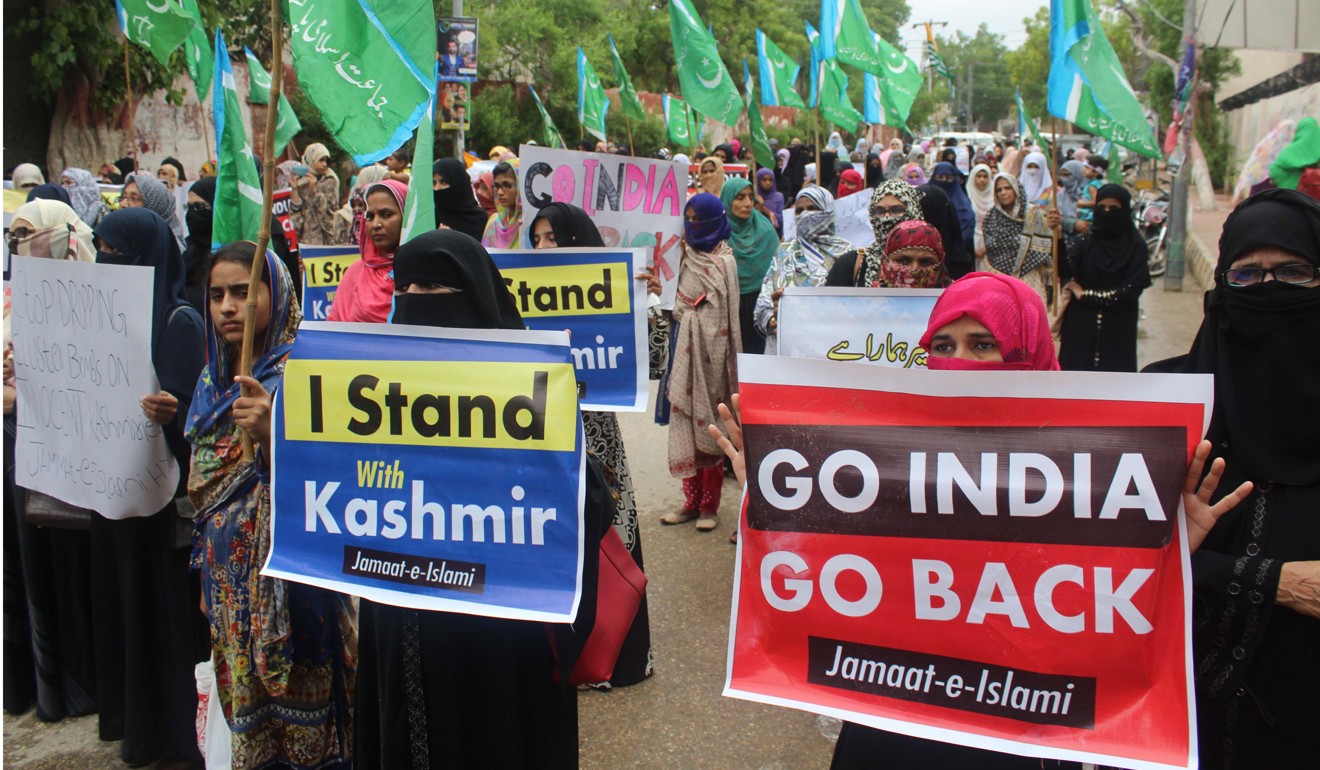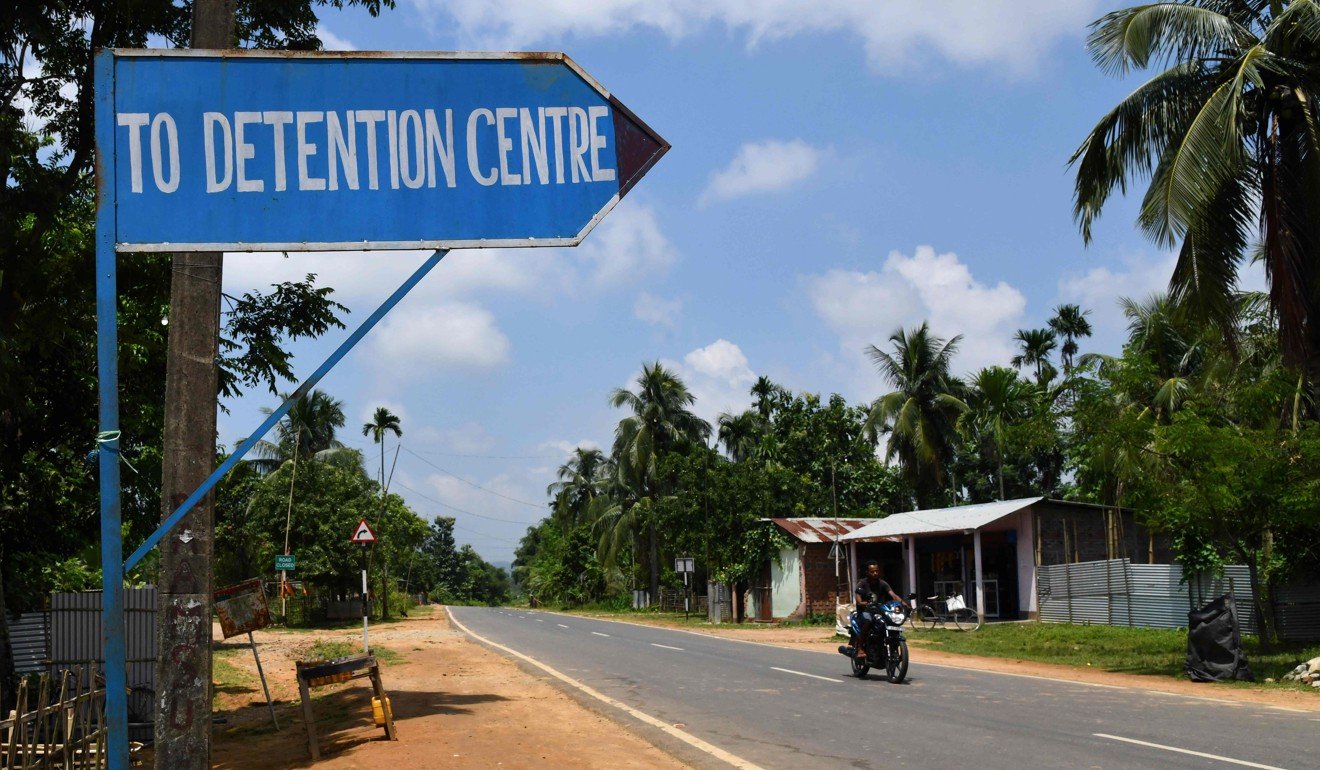Pakistani Prime Minister Imran Khan last week appealed for global intervention in the country’s dispute with
India over Jammu and
Khan wrote in a piece for an international newspaper that failure to do so by major powers would open the door to “direct military confrontation” between the South Asian neighbours.
The article drew a muted response from the international community.
The next day
’s foreign minister sought to tone down the rhetoric, calling for talks with India because “war was not an option”.
’s foreign minister sought to tone down the rhetoric, calling for talks with India because “war was not an option”.
The sequence of events, ending in Pakistan’s offer of conditional talks, was symbolic of India’s diplomatic upper hand.
On Thursday it will be one month since an
began in the conflict-ridden Indian region, after New Delhi decided to strip the state of its autonomy and divide it in two. Communication services remain disconnected, shops and businesses shut. Families struggle to contact each other, while political leaders and activists have been detained.
began in the conflict-ridden Indian region, after New Delhi decided to strip the state of its autonomy and divide it in two. Communication services remain disconnected, shops and businesses shut. Families struggle to contact each other, while political leaders and activists have been detained.

A protest in the Pakistani city of Hyderabad against India’s Kashmir policy. Photo: EPA
Despite Pakistan’s fervent appeals and even threats, India has received widespread diplomatic backing. All major global powers
, echoing India’s oft-stated line that the dispute is bilateral and India’s recent move an “internal” affair.
, echoing India’s oft-stated line that the dispute is bilateral and India’s recent move an “internal” affair.
Two of Pakistan’s closest allies, the United Arab Emirates and
, backed India, with the UAE even bestowing its highest civilian award on Indian Prime Minister
less than 20 days after the Kashmir move.
, backed India, with the UAE even bestowing its highest civilian award on Indian Prime Minister
less than 20 days after the Kashmir move.
After almost a month of the unprecedented lockdown, which is now turning into a humanitarian crisis, how has India retained popular diplomatic support?
The answer lies in a combination of factors, from hectic diplomacy to fragmented global leadership, and plain market economics.
‘Deft diplomacy’
Chitrapu Uday Bhaskar, director of the Society for Policy Studies, a New Delhi-based think tank focusing on public policy and international relations, said India’s diplomatic efforts had ensured its decision on Kashmir was well received.
“The Modi government has been able to play its cards in a very deft manner,” he said. “However, such support is almost always transactional. They [foreign countries] expect a quid pro quo at some point in the future.”
US President Donald Trump has echoed Modi’s line that the situation in Kashmir is “under control”.
The support India has received might not be entirely organic. News reports have suggested the Modi government repeatedly shared their plans to strip Kashmir of its special status with the White House, the first indicator given as early as February.
What also helped India’s case, many believe, was Pakistan’s response.
“Pakistan displayed an overreaction, and its demand that the status quo be restored in Kashmir was an unfeasible one,” said Anil Wadhwa, former Indian ambassador to Italy and a retired secretary in the Ministry of External Affairs. “There was no chance India would roll back its decision, and hence, most countries refused to interfere.”
Money talks
Others believe a major factor driving the international community’s response was trade access to India and the opportunities it offers foreign businesses, especially in times of tariff wars and volatile global markets.
France is pushing India to buy 36 French-made Dassault Rafale fighter planes in addition to 36 jets New Delhi is manufacturing itself. For the UAE, data shows India to be its third-largest trading partner. The United States meanwhile has been pushing Delhi to allow American firms smoother access to Indian markets.
Sameer Patil, a fellow at Gateway House Indian Council on Global Relations who studies international security, said India might have taken its cue from China’s playbook.
“The size of the Indian market is a big reason behind the smooth diplomatic reception to India’s decisions on Kashmir,” Patil said. “India seems to be learning from China in the way that China uses access to its market as a lever in its foreign policy.”
Patil pointed to examples of countries with chequered records on human rights continuing to do business with every major global power.
Another factor which helped tilt the balance in India’s favour was that Pakistan’s economy is infinitely smaller than India’s, Patil added. World Bank data shows Pakistan’s economy to be worth US$313 billion – a fraction of the US$2.72 trillion of its neighbour. Pakistan’s fiscal deficit is fast rising, standing at a staggering 8.9 per cent of gross domestic product – its highest in nearly three decades.
Treading carefully
But despite the celebratory air in India around its diplomatic success, analysts believe the response could change rapidly if the emerging humanitarian crisis in Kashmir is not handled well. A greater challenge may lie ahead of India – one of ensuring unrest does not spiral out of control.
“The internal situation in Kashmir has to be handled carefully, because the international community’s response will be tailored according to that. India will have to avoid any undue use of force,” Wadhwa said.

A sign points the way to a new detention centre built for people not included on the citizens register in Assam. Photo: AFP
Similar diplomatic efforts might be needed by India when it comes to its implementation of the National Register of Citizens in the northeastern state of Assam, which has left 1.9 million people on the verge of statelessness. Leaders in Modi’s Bharatiya Janata Party, including home affairs minister Amit Shah, have called for the deportation of people they call illegal immigrants, saying they have Muslim roots in neighbouring Bangladesh.
On Saturday Pakistani prime minister Khan called the national register an exercise in “ethnic cleansing” targeting Muslims, and said it should send “alarm bells ringing across the world”.
Bhaskar at the Society for Policy Studies said the course New Delhi had charted on Kashmir had created a crisis of perception.
“Many well-wishers in the international community – from academics to journalists as well as those in diplomatic circuits – have been disappointed with India’s steps,” he said. “India must realise that not everything is about image building – there is a substantive reality, and in relation to democratic integrity, India is diminished in its own eyes.”

No comments:
Post a Comment